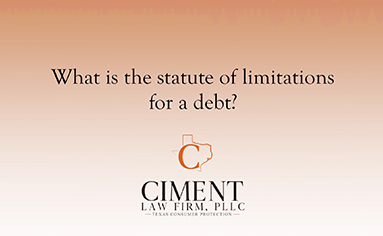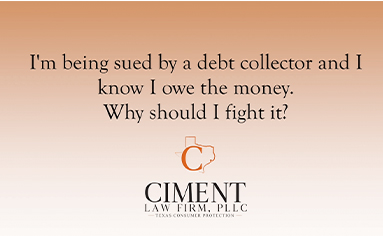We're here to help you.
833-779-9993

Debt Collection Harassment (FDCPA)
How to protect your rights and get compensation for violations
The Fair Debt Collection Practices Act (FDCPA) is a federal law aimed at preventing abusive, deceptive, and unfair debt collection practices. Enacted to safeguard consumers, the FDCPA imposes strict guidelines on how debt collectors may conduct themselves in their efforts to recover debts. Some protections include:
- Protection against harassment or abusive behavior
- The right to request validation of the debt
- The right to dispute the debt's validity
- Limits on communication methods and times
- The right to cease communication from debt collectors
- Prohibition of false or misleading representations
Unfortunately, many debt collectors do not comply with the FDCPA and violate your rights. Some of the common violations include:
- Excessive and intrusive communication
- Threats, intimidation, or use of offensive language
- False representation of the debt amount or legal consequences
- Unauthorized disclosure of the debt to third parties
- Ignoring cease communication requests
- Pursuing debts beyond the statute of limitations
These violations can have serious consequences for your financial and mental well-being. They can cause emotional, mental, and physical distress. They can lower your credit score, prevent you from getting loans, mortgages, credit cards, or other financial products, increase your interest rates, or damage your reputation.
Potential Financial Compensation:
If a debt collector violates your rights under the FDCPA, you may be entitled to financial compensation. The FDCPA allows consumers to seek damages for actual losses, statutory damages up to $1,000, and reasonable attorney fees. Pursuing a claim not only holds debt collectors accountable but also provides a remedy for the emotional distress caused by their unlawful practices.
However, filing a lawsuit under the FDCPA can be complex and challenging. You need to gather evidence, follow the legal procedures, and prove your damages. That's why you need the help of an experienced and dedicated law firm that specializes in FDCPA cases.
How The Debt Defenders Can Help:
At The Debt Defenders, we have the knowledge, skills, and resources to fight for your rights and get you the compensation you deserve. We have helped thousands of consumers like you who have suffered from debt collection harassment. We will:
- Review your case for free and determine if you have a valid claim under the FDCPA
- Collect and preserve all the evidence of debt collection harassment, such as letters, phone calls, voice mails, or texts
- Negotiate with the debt collector on your behalf to stop the harassment and seek a fair settlement
- File a lawsuit in federal court if the debt collector refuses to cooperate or comply with the law
- Represent you in court and advocate for your best interests
- Recover the maximum amount of compensation for your actual damages, statutory damages, and attorney fees
The timeline of a lawsuit can vary depending on the facts and circumstances of your case, but generally, it involves the following steps:
- Discovery: This is the phase where both parties exchange information and evidence related to the case, such as documents, records, or witness statement
- Depositions: This is the phase where both parties question each other or their witnesses under oath, usually in front of a court reporter
- Mediations: This is the phase where both parties try to reach a settlement with the help of a neutral third-party mediator, who facilitates the communication and negotiation
- Trial: This is the phase where both parties present their arguments and evidence to a judge or jury, who decides the outcome of the case
If you've been subjected to debt collection harassment, remember that you have rights under the FDCPA. The Debt Defenders are here to help you assert those rights, put an end to abusive practices, and seek financial compensation for any violations. Contact us today to take the first step toward reclaiming control over your financial and mental well-being.
About us
Inaction Can Lead To Judgment Against You
Some debtors choose to ignore a debt collection lawsuit. They don’t feel they have a legal defense, so they don’t respond to the lawsuit. If you don’t respond to the lawsuit, the creditor will not be challenged in court. That means the court might enter a default judgment against you, even if the paperwork contains errors. Hire a debt lawsuit defense lawyer in Texas to defend your case instead.
About usdebt collection faq
GET A PERSONALIZED DEBT RESOLUTION SOLUTION how can the debt defenders help?





